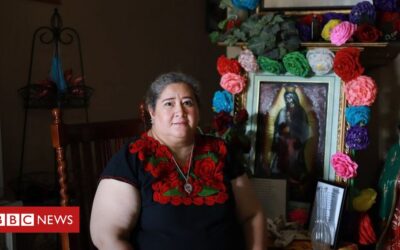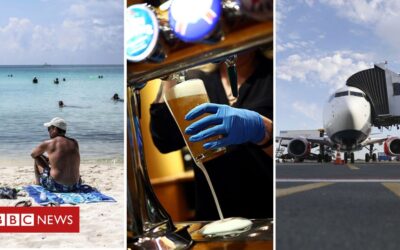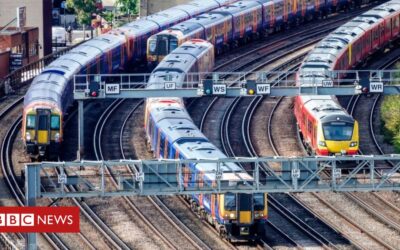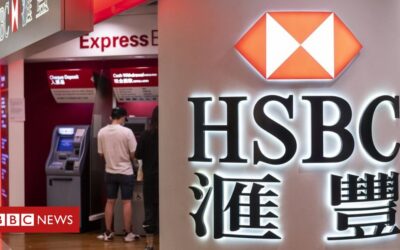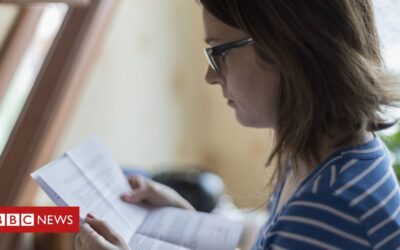Minority communities in the US and elsewhere have sometimes turned to traditional money saving methods outside the formal banking system. The economic shock from the coronavirus pandemic could spur renewed interest in those savings clubs. When Hilda Robles recalls her first years in America, tears come to her eyes.”I cried and even wanted to leave at one point because I felt alone,” she says. “I would ask people for help and they couldn’t help me because they didn’t understand Spanish and I didn’t understand English.”When she came to San Antonio, Texas some 20 years ago, even daily duties like getting to work or going to the doctor were feats of bilingual diplomacy and logistical planning – she had no car, no English and almost no one to turn to for help. Opening a bank account seemed impossible. “When I stepped into a bank for the first time, I was told I couldn’t open a bank account because I had no social security number,” she says. “Someone told me about a bank where I could open an account with no social security number, but the language barrier stopped me from going.”So Ms Robles, 49, went a different route – she started a tanda, an informal savings club popular in Latin America, with contributions from her extended relatives. Members of the club each contribute a fixed sum to a pool of money on a regular, periodic schedule, with the lump sum going to one member each round until everyone gets paid. This means that members get back what they put in over the course of the scheme, but by getting it in the form of a lump sum, the money can be put to use for purchases, investments or debt payments they otherwise could not afford. Members who get their “hand” early are effectively receiving an interest-free loan, while those who receive theirs later in the cycle are essentially withdrawing a lump of “saved” cash. With the $5,000 lump sum she received for her turn of her tanda, Ms Robles bought her first car. Her relatives and friends in the savings club were able to put down payments on houses, pay for university tuition – and now, amid the Covid-19 pandemic, survive when their families have been out of work or sick.Since that first savings club 14 years ago, Ms Robles has run them continuously with only a few months break to organise the next one. “It gives me a lot of joy to see people reach their goals because of the tandas without having to drown in debt from loans,” she says. “It’s proof that among us Hispanics, we can get ahead here.”Hispanic-Americans are not alone in their use of this ancient savings mechanism that has parallels all over the globe, known generally as a rotating savings and credit association, or roscas.’I’m just looking for whatever I can get’
Where $1,200 payments are going – food, bidets, guns
In Mexico, they are popularly called tandas, but they are also known as huis, susus or ballot committees in various parts of the world. Immigrant communities continue their practice in the US. As economic hardship accompanies the public health crisis caused by the Covid-19 pandemic, for some families, traditional methods of saving outside the banking system have become a lifeline, especially for hard-hit immigrant communities with little access to mainstream sources of capital.Financial access and security in America has become an increasingly pressing subject of discussion in 2020. Even before the pandemic, the US was behind other rich countries when it comes to accessing money and credit.Some seven percent of Americans over the age of 15 did not have any kind of bank accounts in the US in 2017, compared to less than one percent of Canadians, and less than four percent of Britons, according to the World Bank. A quarter of American adults – more than 80 million people – were “unbanked” or “underbanked”, meaning either that they had no accounts entirely, or that they are forced to use alternative services besides traditional banks in order to get enough financial access to meet goals or obligations. Households most likely to fall into the two categories were black or Hispanic, lack university qualifications and to be poor. To access loans, they must sometimes turn to non-bank lending options like payday lenders or loan sharks.These shadow banking options can be risky, charge high interests and bring dire consequences for borrowers who struggle to pay – but a rosca can provide a safer, more trustworthy alternative.”These systems are actually useful when we have bank systems that have a finite possibility,” says Caroline Hossein, a professor of business and social studies at York University who studies roscas in communities in Canada. “Banks only have a certain amount of money, and if you only have a certain amount of money, you’re only going to dish it out to those that are less risky. Coronavirus: ‘We’re still waiting at home for them to come back’
Coronavirus: ‘We used to donate to this food bank, now we rely on it’
“So it makes perfect sense that people would engage in these kinds of mutual aid or money pooling systems.”Often, they are run by women, whom Dr Hossein calls the “banker ladies” of the community. “The banker lady, who might be the one organising it – you can be in touch with her anytime of day, it may be someone who lives in your neighbourhood so [there’s] the ease of getting there. “The paperwork is not as treacherous as it would be as a formal bank, so there’s a kind of kinship that exists because it’s people who voluntarily like and know each other.”Though they tend to be “more of a life line for people who have difficulty accessing banking, particularly on the lending side,” such savings schemes are also used by more established members of communities who may have inherited knowledge about them from immigrant parents. Beyond access to a pool of money, “a primary benefit is building ‘bonds of mutual trust’ within a network of trustworthy people,” says Lee Martin of the University of California, Davis. Roscas are primarily beneficial for people without access to mainstream forms of credit, he says. But because they are used by marginalised communities, studying their overall prevalence and use has been difficult, says Dr Hossein, who participates in a rosca – known as a su-su in her Afro-Carribean community – as part of her research. “A lot of these roscas, particularly in places like Canada, the US or Europe, tend to be underground,” she says, because many worry that the endeavour is seen as an unrespectable or even an illicit form of financing, only for those who are short of options. Clearly, unlike a savings account, they do not generate interest. Yet economists believe they are probably quite common in the West. One survey of Korean-American garment business owners in Los Angeles from 2004 found that 77% of households had participated in a version of the lending scheme.Self-lending within communities can have unexpected benefits. A rosca-like system among Chinese immigrants in Spain, for example, helped expatriate businessmen weather the Euro crisis of the late 2000s and 2010s. The Chinese business community was “largely insulated from the vagaries of the country’s tottering retail banking system” – precisely because the system that shut them out meant they turned to each other, reported the Financial Times in 2014.In the 2020 Covid-19 crisis, families who participated in the tanda Ms Robles is running were able to pay their bills when some fell ill and could not work. For most, it was their only source of cash, Ms Robles says – only one of the families has received a cheque from the government for coronavirus relief because they lack the papers to get onto the dole. Like any investment scheme, however, roscas are not risk-free. A participant could fail to pay their hand, or take their share and run. Ms Robles says there have been rare times that she misplaced a contribution and had to make up the difference out of her own pocket, which can be costly. As they operate on trust, usually within a deeply connected community, the social consequences of misdeeds dissuades wrong-doing.But since they are run by privately, there is little legal recourse for cheating. And unlike putting money in a bank savings account, there is no interest paid.Could roscas catch on and become more mainstream? The Federal Reserve Bank of Philadelphia asked just such a question in 2006, but was sceptical given the depth of trust it would require.An attempt by Yahoo Finance to popularise a tanda app in 2018 was unsuccessful. The scheme shut down after only a few months due to, it would seem, lack of participation. There are two big hurdles, as Dr Hossein sees it – the stigma attached to a non-traditional financial tool used by ethnic minority communities, and the barrier in trust that must be surmounted to put one’s faith in other people to handle money.But with the Covid-19 pandemic, a younger generation of North Americans with an interest in sharing resources and the technology to do so efficiently – from crowdfunding to forms of “caremongering” – roscas are bound to be a savings method that continue and evolve and expand.For Mayra Martinez, 30, a university administration professional in Dallas, Texas, being in tandas has helped her learn about trust and foster a sense of obligation to save, which can otherwise be hard for young people like herself she says.”It’s not like your commitment to yourself, where you can easily say ‘hmm, I’m not going to do that this month because I just don’t want to,” she says.It is an added layer of security in an economic world that has been particularly unpredictable for young professionals, which Ms Martinez says she has seen first-hand – her sister and brother-in-law each recently tested positive for Covid-19 and could not work. “She just happened to get her tanda this week,” says Ms Martinez. Because of that, Ms Martinez says, her sister was able to tell her husband: “It’s ok”.The tanda Ms Martinez is involved in now consists of family members from all generations and is run by her mother.Would she ever take over and start one for her own cohort of siblings and cousins once the older generations retire from such schemes?”I wouldn’t mind running one,” she says, adding with a laugh, “but it depends on which cousins.”
BBC Business News Articles
GE: Industrial giant will stop building coal-fired power plants
In a dramatic reversal, one of the world’s biggest makers of coal-fired power plants is to exit the market and focus on greener alternatives.US industrial giant General Electric said it would shut or sell sites as it prioritised its renewable energy and power generation businesses.It comes ahead of a US Presidential election in which the candidates hold starkly different views on coal.NGO the Natural Resources Defense Council said the move was “about time”.GE has said in the past it would focus less on fossil fuels, reflecting the growing acceptance of cleaner energy sources in US power grids.But just five years ago, it struck its biggest ever deal – paying almost £10bn for a business that produced coal-fuelled turbines. ‘Attractive economics’In a statement, the firm suggested the decision had been motivated by economics. Russell Stokes, GE’s senior vice president, said: “With the continued transformation of GE, we are focused on power generation businesses that have attractive economics and a growth trajectory. “As we pursue this exit from the new build coal power market, we will continue to support our customers, helping them to keep their existing plants running in a cost-effective and efficient way with best-in-class technology and service expertise.”Could the coronavirus crisis finally finish off coal?US President Donald Trump has championed “beautiful, clean coal” at a time when other developed countries are turning away from polluting fossil fuels. In a bid to revive the struggling US industry, Mr Trump has rolled back Obama-era standards on coal emissions. But it has not stopped the decline as cheaper alternatives such as natural gas, solar and wind gain market share. GE said it would continue to service existing coal power plants, but warned jobs could be lost as a result of its decision.The firm is already cutting up to 13,000 job cuts at GE Aviation, which makes jet engines, due to the pandemic. In a tweet, the Natural Resources Defense Council said: “Communities and organizers have been calling on GE to get out of coal for years. This is an important and long overdue step in the right direction to protect communities’ health and the environment.”
Airbus looks to the future with hydrogen planes
Aerospace giant Airbus has unveiled plans for what it hailed as the first commercial zero-emission aircraft.It said its hydrogen-fuelled passenger planes could be in service by 2035.Airbus chief executive Guillaume Faury said the three ZEROe concept designs marked “a historic moment” for commercial aviation sector”.The use of hydrogen had “the potential to significantly reduce aviation’s climate impact”, he added.However, analysts point out that it is not the first time that hydrogen has been touted as the saviour of modern aviation.The history of the fuel goes back to the days of airships in the early 20th Century, but the Hindenburg disaster in 1937 brought that era to an end.More recently, from 2000 to 2002, Airbus was involved in the EU-funded Cryoplane project, which studied the feasibility of a liquid hydrogen-fuelled aircraft.After that, the idea fell out of favour again – until now.’Decisive action’Unveiling its latest blueprints, Airbus said its turbofan design could carry up to 200 passengers more than 2,000 miles, while a turboprop concept would have a 50% lower capacity and range.A third, “blended-wing body” aircraft was the most eye-catching of the three designs.All three planes would be powered by gas-turbine engines modified to burn liquid hydrogen, and through hydrogen fuel cells to create electrical power.However, Airbus admitted that for the idea to work, airports would have to invest large sums of money in refuelling infrastructure.”The transition to hydrogen, as the primary power source for these concept planes, will require decisive action from the entire aviation ecosystem,” said Mr Faury.”Together with the support from government and industrial partners, we can rise up to this challenge to scale up renewable energy and hydrogen for the sustainable future of the aviation industry.”The new Airbus designs are the fruit of a joint research project that Airbus launched with EasyJet last year to consider hybrid and electric aircraft.The airline’s chief executive, Johan Lundgren, said: “EasyJet remains absolutely committed to more sustainable flying and we know that technology is where the answer lies for the industry.”
Microsoft buys Fallout creator Bethesda for $7.5bn
Xbox-owner Microsoft has acquired the games company behind blockbuster titles including Doom, Fallout, Skyrim and Wolfenstein.It is paying $7.5bn (£5.85bn) for Bethesda’s parent ZeniMax Media. Xbox has said that the publisher’s franchises would be added to its Game Pass subscription package for consoles and PCs.This could help make the forthcoming Xbox Series X more attractive than the PlayStation 5 to some players.Both machines are due to launch in November.Game Pass already gives players access to more than 200 games. Microsoft includes first-party titles at point of launch to those signed up to its “ultimate” package without further cost. By contrast, Sony has opted to charge players up to £70 for its own major releases and does not intend to include new titles in its PlayStation Plus Collection service.It is not yet clear how the takeover affects Bethesda’s plans to create The Elder Scrolls 6, Starfield and other unfinished games as cross-platform titles.In a statement, Xbox chief Phil Spencer said the two firms “shared similar visions for the opportunities for creators and their games to reach more players in more ways”.Pete Hynes, senior vice president at Bethesda Softworks, said the deal offered “access to resources that will make us a better publisher and developer”.”We’re still working on the same games we were yesterday, made by the same studios we’ve worked with for years, and those games will be published by us,” he wrote in a blog.In addition to the games titles, Microsoft will now also own the id Tech games engine, developed by Bethesda’s sister firm id Software. Doom Eternal, which was released this year and received praise for the quality of its graphics, was built using the most recent version of id Tech.Piers Harding-Rolls, research director from Ampere Analysis, described the deal as “a major coup”.”Microsoft has often been criticised for its lack of heavy-hitting first-party games franchises when compared to Sony and Nintendo. This deal catapults Microsoft’s games portfolio into a much stronger position,” he told the BBC.Legendary games developer John Carmack – who pioneered some of the technologies behind the original Doom, Wolfenstein and Quake games – has also suggested the acquisition could bring him back to some of those franchises.Until recently, he had served as the chief technology officer of Facebook’s Oculus virtual reality division.His return would build further excitement for future Xbox games, and thus benefit the brand.
Global shares fall as lockdown fears hit leisure sector
Leading shares in the US and Europe have fallen sharply amid fears that a renewed rise in coronavirus cases will blight economic prospects.The Dow Jones in New York was nearly 3% lower in afternoon trading, while London’s FTSE 100 share index closed down 3.4%, with airlines, travel firms, hotel groups and pubs leading the rout.Worst hit on the FTSE was British Airways owner IAG, down 12%.Similar falls were seen on markets in Paris, Frankfurt and Madrid.
TikTok deal under new threat as Trump insists on total US control
image copyrightGetty ImagesPresident Donald Trump has cast fresh doubt over the future of TikTok in the US unless Oracle and Walmart have “total control” of the company.TikTok escaped a US ban on Sunday, after striking a deal with the American companies.China-based owner Bytedance earlier said it would retain an 80% stake in the new company, TikTok Global.But President Trump said: “They will have nothing to do with it. And if they do, we just won’t make the deal.”‘Controlling interest’He had threatened to ban the app on security grounds unless a sale was agreed with a US company by the middle of September.The two main US investors, Oracle and Walmart, have said they will be taking a combined 20% stake in TikTok Global.But Mr Trump, naming the two companies, said: “They are going to have total control of it. “They are going to own the controlling interest.”And then I guess they are going public and they are buying out the rest of it, they are buying out a lot.”If we find that they don’t have total control, then we are not going to approve the deal.”‘False rumours’Mr Trump had previously publicly given the proposed deal his blessing – but there have also been conflicting messages from the companies involved.Oracle has confirmed its planned 20% bid with Walmart – but has also issued a statement from its executive vice-president, saying: “Americans will be the majority.”And ByteDance will have no ownership in TikTok Global.”Bytedance, meanwhile, wrote on its Chinese language website it wanted to offer an “explanation of some false rumours”.As well as saying it would keep an 80% stake in TikTok Global, it said there was no plan to transfer ownership of the valuable algorithms that power TikTok.It also said it had not heard about a $5bn (£4bn) contribution to a new education fund, requested by President Trump at a rally in North Carolina.Mr Trump said at the weekend that he had asked the companies involved to put up the money “so we can educate people as to the real history of our country”.TikTok said the $5bn figure was “a forecast of the corporate income tax and other operating taxes that TikTok will need to pay for its business development in the next few years” and said it had not been finalised.It added, in a statement made on social media: “We would like to clarify that this is the first time that we have heard the news about a $5bn education fund”.”China has been determined to emphasise in recent months that the country still has full control of TikTok, amid nervousness at home over the company potentially being divested,” said the BBC’s China Media Analyst Kerry Allen.image copyrightTwitter”When Oracle agreed a deal with ByteDance last week so that TikTok could remain active in the States, Chinese media emphasised that the deal was “co-operative”, with both parties playing an equal part, rather than Oracle bailing out the Chinese tech giant.”But China may yet decide that it does not approve of the deal, said Dr Richard Windsor, founder of research firm Radio Free Mobile. That’s because while Bytedance may retain TikTok’s algorithm, it will still run on US Oracle’s infrastructure.”If one flips the deal on its head and imagines a situation where a world-leading piece of US software was going to be run on Chinese servers where a Chinese company had full access to it, one can start to see why China might object,” he said.Related TopicsTikTokChinaDonald TrumpMore on this story
Premium Bonds issuer slashes chance of winning
National Savings and Investments (NS&I), which issues Premium Bonds, has slashed the interest rates it pays.The dramatic cut will hit the savings of 25 million people who have invested with NS&I, which allows people to lend money to the government.It will also reduce the chances of those who own Premium Bonds from winning any of the monthly prizes on offer, which include a £1m jackpot.Savers will soon have a one-in-34,500 chance, against one-in-24,500 now. It is also slashing the number of £100,000 prizes from seven to four and £50,000 prizes from 14 to nine.Funding the crisisAs government spending increased to fund the response to the coronavirus crisis, so did the amount that NS&I was asked to raise for the government. In July, its target was increased from £6bn to £35bn. In the first three months of its financial year to June, NS&I raised £14.5bn and it said demand had been “similarly high” in the second quarter, which finishes at the end of this month.The savings scheme said some of its interest rates were above those offered by High Street banks, which caused a surge in demand.”Reducing interest rates is always a difficult decision,” said NS&I chief executive, Ian Ackerley.”Given successive reductions in the Bank of England base rate in March, and subsequent reductions in interest rates by other providers, several of our products have become ‘best buy’ and we have experienced extremely high demand as a consequence,” he said.”It is important that we strike a balance between the interests of savers, taxpayers and the broader financial services sector; and it is time for NS&I to return to a more normal competitive position for our products.”
Media playback is unsupported on your device
The changes to Premium Bonds will come in for the December prize draw.Meanwhile, interest rates on other products will be lower from 24 November – and they include some steep drops.NS&I’s direct saver will offer just 0.15% interest, down from 1% before. Meanwhile, the rate on its income bonds will fall to 0.01%. It was previously 1.15%.The rate on its investment account will also be 0.01% when the rates change, that’s down from 0.8%. And the direct ISA will offer 0.1%, compared with the 0.9% savers get at the moment.Kids will do a bit better, getting 1.5% interest from the junior ISA, although that is still well below the 3.25% they can get now.
Emergency measures to help train firms survive extended
The government has agreed new emergency deals with train companies.Under the arrangement, taxpayers will continue to cover any losses on the railways, caused by low passenger numbers, for another 18 months. Throughout that period ministers hope to carry out broader reforms to Britain’s railways. They will consider adopting a concessions-based system in the longer term, whereby train companies are paid a fixed fee to run services. It marks the end of rail franchises, which have been in place since the 1990s. Is it safe to use public transport?
What has gone wrong with rail franchising?
When the country went into lockdown, the government agreed to pay the losses of train companies which had been hit by falling ticket revenue.It meant trains were still able to run, even with very few passengers.Since then, passenger numbers have slowly risen but they are still less than half their pre-pandemic levels.So far, the bill for carrying the losses of train companies has run to at least £3.5bn and the Department for Transport has said “significant taxpayer support will still be needed” under the new agreements. But it has reduced the fees that train companies will receive for running services.In a statement, Transport Secretary, Grant Shapps said: “The model of privatisation adopted 25 years ago has seen significant rises in passenger numbers, but this pandemic has proven that it is no longer working.”He said the move to a new system would end “uncertainty and confusion about whether you are using the right ticket or the right train company”.SystemTrain companies have welcomed the plans to replace Britain’s often-criticised system of rail franchising.Paul Plummer, the boss of the Rail Delivery Group, which represents train firms, called for a simpler-to-use fare system.He said: “These transitional contracts should be a stepping-stone to a better railway.”But rail expert Sir Michael Holden, who used to run South West Trains, said: The big issue is, what is that something else to look like?”He told the BBC’s Today programme that the current emergency measures were “the worst possible arrangement to run the railways”.”We’ve got the dead hand of the government on the helm… controlling all of the detailed decisions of the railway.””And yet, they’re still paying for public sector operators to run the railway for them.”
HSBC's shares dive to lowest level since 1995 in HK
HSBC’s share price in Hong Kong has fallen to its lowest level since 1995 amid allegations of money laundering.HSBC allowed fraudsters to transfer millions of dollars around the world even after it had learned of their scam, leaked secret files show.The UK-based bank faces multiple pressures including political tension in Hong Kong and the pandemic fallout.On Monday in Asian trading, HSBC’s share price fell more than 4% to below HK$30 (£3) as its freefall continued.This year its share price, which is also listed on the London Stock Exchange, has plunged by around 50%.While HSBC is headquartered in London, more than half of its profits come from the Asian financial hub of Hong Kong.Its role in a $80m (£62m) fraud is detailed in a leak of documents – banks’ “suspicious activity reports” – that have been called the FinCEN Files.HSBC moved the money through its US business to HSBC accounts in Hong Kong in 2013 and 2014.The bank says it has always met its legal duties on reporting such activity.Multiple pressuresBefore the leaked files were revealed, HSBC had been under pressure on multiple fronts which has weakened its share price.Europe’s biggest bank has set aside between $8bn and $13bn this year for bad loans as it expects more people and businesses to default on their repayments because of the coronavirus pandemic.In August it reported a 65% drop in pre-tax profits to $4.3bn for the first half of the year – much steeper than analysts had forecast.It also became embroiled in a political battle over its support of China’s national security law in Hong Kong and was lambasted by both the US and UK.Cost-cuttingHSBC is currently pushing ahead with major restructuring of its global banking operations. Chief executive Noel Quinn, who officially took over in March, said the bank would further pivot into Asia as its European operations lose money.Mr Quinn said HSBC would “accelerate” an earlier restructuring plan which includes the axing of 35,000 jobs.UK bank Standard Chartered, which was also named in the leaked files, saw its Hong Kong share price fall in Monday Asian trading.
Renters: Eviction cases resume after six-month ban
Eviction hearings will now resume in courts in England and Wales – but the most serious cases will be given priority.A backlog has built up during a six-month ban on proceedings in place during the coronavirus outbreak.Cases involving domestic violence or anti-social behaviour will be heard first. Restrictions also exist in local lockdown areas and over Christmas.But Labour and campaigners have called for the ban to be extended.What are the eviction rules?There have been warnings from charities and health bodies about the dangers during the pandemic of people being made homeless and living in overcrowded conditions.A recent survey by homelessness charity Shelter suggested that more than 170,000 private tenants had been threatened with eviction by their landlord or letting agent, while 230,000 in England have fallen into arrears since the pandemic started.However, the government and landlord groups do not expect a wave of eviction notices.’Future in the balance’Wedding DJ Ian Forest has seen his income “killed for a year” as a result of the coronavirus outbreak.His letting agent allowed him to pay 50% of his rent for a few months, but he now faces demands for full rent again, as well as £3,000 of arrears.He has claimed all the financial support available, but is concerned that it is insufficient to cover his bills and his tenancy is at risk.”I feel for the landlord as well, but my future here is in the balance. Who knows what will happen,” he said.In England, Wales and Scotland, landlords must now give six months’ notice of eviction compared to two months before the pandemic in many areas. In Northern Ireland, it is 12 weeks, but the authorities said notices should not be issued unless “absolutely unavoidable”.Courts in England and Wales will prioritise serious cases, and historic ones where the rent has not been paid for more than a year.Chris Norris, of the National Residential Landlords Association, said that a switch would not be turned on leading to a sudden spate of evictions.But he said the last six months had seen “real restrictions” on landlords trying to deal with “nuisance neighbours”.Housing Secretary Robert Jenrick said that evictions would not be enforced by bailiffs if a local area was in a lockdown that included restrictions on gathering in homes.Bailiffs have also be told not to enforce possession orders over Christmas, other than in “the most serious circumstances”, such as cases involving domestic abuse or anti-social behaviour.But Labour said there were still unnecessary risks created by the government’s policy.Shadow housing secretary Thangam Debbonaire said: “The government needs to come forward with a credible plan to keep their promise that no renter will lose their home because of coronavirus.”Advice for tenantsAnyone under threat of eviction should start gathering evidence, such as receipts for rent paid or any communications with your landlord
Landlords have to give you notice before they can apply to court for a possession order. For most tenancy types, this notice must now be at least six months in England, Wales and Scotland, but lodgers may get less notice
If a possession order had already been made against you before 27 March 2020, then your landlord may apply for this to be enforced now the ban is at an end. You should receive 14 days’ notice of the eviction date
Anyone now struggling to pay rent should speak to their landlord and organise a repayment plan to pay off arrears
Those receiving housing benefit or Universal Credit and unable to pay rent might be able to get a discretionary housing payment from the local council
Source: Citizens Advice

